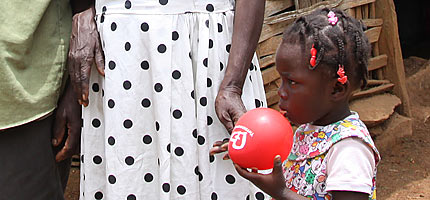© Finn Church Aid/Minna Törrönen
Haiti: Children Come First
Children come first in the village of Couchavel in mountainous western Haiti, where the Lutheran World Federation (LWF) is working alongside struggling families.
The village is waking up. A cock crows and women are lighting up fire in the kitchen huts. Elphise Delya and her daughter Lucia, prepare breakfast—pumpkin, banana and coffee. Since the rain water supply dried up, Lucia fetches water from several kilometers away.
Her younger sisters are ready to go to school in the neighboring village of Desbagnes.
Their father, Agnedu Olmy, a daily farm laborer, drinks his coffee and eats steamed banana. When nobody needs help, he tends to the family field, though it does not yield enough corn and beans to support the household. Erosion has weakened the soil, and storms have destroyed the crops. A day’s work for others earns him a few dollars and a meal. But lately there has been little work, because of the destruction by the storms.
Elphise tends the village teacher's plot, growing sweet potato, taro tuber (malangá) and pumpkin. The money she earns pays their children’s school fees.
“At times it is really hard, when we do not manage to provide enough food for the family. However, children come first. We grown-ups can go without food for a while, but we always find something for the children,” says Olmy.
Environmental problems and resulting natural disasters, especially storms and erosion, affect food availability for an estimated two million Haitians.
The Olmy family along with many others is dependent on imported rice, flour and sugar. Sixty percent of food in Haiti is imported.
Only two percent of the country’s forests still remain following decades of unsustainable forestry. This has led to soil erosion and dwindling water resources. Because of the erosion, tropical storms—more frequent due to climate change—have been devastating.
The Olmy family plots were destroyed and their farm animals died in the 2008 autumn storms.
Life has been difficult.
However, today, LWF project workers are conducting interviews in the area to determine how to help the vulnerable families.
The people of Couchavel can receive training on how to make the land productive again by using composted soil. Villagers will be trained to prepare for storms and natural catastrophes. About 150 families will get a goat or chickens to raise. Water reservoirs will be built.
Olmy is hopeful. He knows that it is possible to prepare for storms and that after the turbulence the earth produces wild plants. “Those leaves and grass are salted and eaten, and at first, that is how we survive. As soon as it is possible, we will start to cultivate the land again.”

